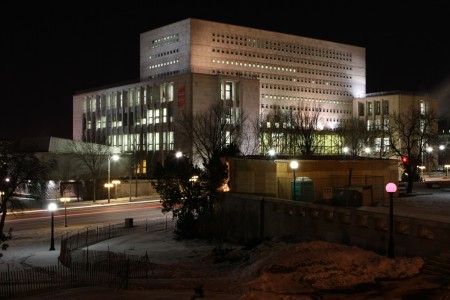Given our increasingly slim chances of avoiding more than 2˚C of global warming, it makes sense to start thinking about what a world hotter than that could be like.
The University of Oxford recently hosted a conference on the subject: 4degrees International Climate Change Conference: Implications of a Global Climate Change of 4 plus Degrees for People, Ecosystems, and Earth Systems.
32 of the short lectures are available free, via iTunes.
As an aside, posts might be thin here for the next while. Work is busy, and I am concentrating efforts on BuryCoal. If you haven’t had a look at that site yet, please do. Some good discussions on the posts people have already written would be just the thing.


The 4degrees and beyond conference took place between 28-30 September 2009.
The conference saw over 140 delegates gather from the science community, government, NGOs and the private sector, to attend 3 days of presentations and discussion. All abstracts, presentations and audio recordings from the conference can be found on the Programme and Presentation Downloads page, and media coverage can be found on the Media and Outputs page.
The conference was co-hosted by the Environmental Change Institute, the Tyndall Centre for Climate Change Research and the Met Office Hadley Centre. online.
Rationale
Despite 17 years of negotiations since the 1992 Rio Earth Summit, global greenhouse gas emissions have continued to rise. Since 2000 the rates of annual emissions growth have increased at rates at the upper end of the IPCC scenarios, presenting the global community with a stark challenge: either instigate an immediate and radical reversal in existing emission trends or accept global temperature rises well beyond 4°.
The immediacy and scale of the reductions necessary to avoid anything below 4°C, and indeed the human and ecosystem implications of living with 4°C, are beyond anything we have been prepared to countenance. Understanding the implications of 4°C and higher temperatures is essential if global society is to make informed choices about the balance between “extreme” rates of mitigation and “extreme” impacts and adaptation costs.
The aim of this conference is therefore to: (i) assess the consequences of a change in global temperature above 4°C for a range of systems and sectors, and (ii) explore the options that are open for avoiding climate changes of this magnitude. The results of the conference will form an important background to the COP 15 United Nations Climate Change Conference, in Copenhagen, December 2009, and the inevitable negotiations that will follow COP 15.
Listen to Kevin Anderson’s “Global emission pathways” and you start to get an idea of the scale of what must be done.
It would be better if there were slides along with these audio files.
thanks for linking this.